- Type of Surgery Determines Aftercare
- Caring for the Back Once Home
- Additional Guidelines for Home Care
- Pain Management
- Patience and Attentiveness Required
Taking care of yourself after spinal surgery is important to recovery. Following the surgeon’s instructions is one of the most important steps to take to ensure a rapid recovery as possible. There are several types of back surgeries and general guidelines for after spine surgery care.
Type of Surgery Determines Aftercare
There are many different types of back surgeries, and some of the most common are:
- Spinal fusion – the fusion of two bones in the spine to correct problems
- Discectomy – removal of part or all of a spinal disc that has herniated (bulged or ruptured) and causing pain
- Laminectomy – removal of parts of ligaments, bone spurs, or parts of a bone in the back to treat lumbar spinal stenosis (compressed spinal canal pinches nerves)
- Foraminotomy – widening the bony hole in the back where nerve roots leave the spinal column
- Vertebroplasty and kyphoplasty – repairing vertebral compression fractures that are usually due to osteoporosis.
There are other types of back surgeries, but these are the ones most frequently done to help people in pain from a back condition. After surgery, people return home and must follow specific self-care guidelines to speed up the healing process.
Caring for the Back Once Home
There is always a recovery period after surgery. The time it takes to recover depends on a number of factors that include the type of surgery, patient’s age and patient’s general health. For example, recovery after discectomy is usually pretty quick. It takes more time to recover from a spinal fusion or laminectomy.
Following the physician’s orders for home care after back surgery is important and crucial to ensuring recovery is as quick as possible. There are some general guidelines for all types of surgeries.
- Posture
Instead of bending at the waist, be sure to bend the knees and squat down when picking something up.
- Lifting
Do not lift more than 10-15 pounds; be aware of even normal activities requiring lifting, like picking up young children or a laundry basket.

- Sitting
Sit for only 20-30 minutes at a time to avoid spinal compression.
- Walking
For the first two weeks after surgery, only take short walks; slowly increase the amount of walking and not overdue it.
- Wear brace
Some patients will wear a back brace when walking or sitting; the physician determines how long the brace is necessary.

- Activities
Do not do strenuous activities, like jogging or golfing; do not due household duties that put a strain on the back, like gardening and vacuuming.
- Physical therapy
Attend all physical therapy sessions prescribed by the physician.
- Driving
Do not drive for the first two weeks after surgery, and then slowly build up driving time as necessary.
- Medications
Be sure to take any medications prescribed.
- Wound care
Take proper care of the wound (surgical incision).
- Keep the wound dry for 5-7 days
- Cover the incision with plastic material while showering
- Do not soak the wound with water from a showerhead
- Be alert for signs of infection, like fluid drainage, swelling or redness
Spinal surgery precautions also include being careful and attentive to their surroundings. For example, the two most dangerous rooms in the house in terms of places where people are most likely to experience accidents are the bathroom and kitchen. Patients want to avoid slipping and falling while recovering from back surgery. For the first couple of weeks, get someone to assist with getting in and out of the shower or with cooking, which requires a lot of standing.
Additional Guidelines for Home Care
People who have been in pain due to a spinal condition are always anxious to return to normal activities after surgery. The restrictions after back surgery are intended to ensure the recovery period is as short as possible. It is important to adhere to the self-care plan the physician will develop.
Each type of surgery, coupled with the patient’s general health, determines the specific instructions a patient receives and the length of time it takes to fully recover. For example, recovery after spinal fusion takes 1-3 months because the bones need time to grow together and gain strength. The patient is advised to avoid twisting, bending forward and backward, strenuous activities, and lifting anything heavier than 10-15 pounds.
In comparison, it usually takes 1-4 weeks to recover from a discectomy. The instructions for aftercare will be similar though: for a couple of weeks, no twisting or bending, strenuous activity or bending at the waist.
There are two things every surgery patient should not do during the recovery phase:
- No smoking
- No alcohol (especially if on medications)
Walking after back surgery of any kind is advised for the first six weeks after surgery. Walking promotes healing by increasing blood circulation and strengthening muscles. The key is to start slowly and not overdo it. Start slow walking for a short period of time with the goal of walking twice a day for 30 minutes each time.

Pain Management
Some people do need to take pain medications after back surgery. Nerve pain after back surgery can range from mild to severe. There is a condition called “failed back surgery syndrome” in which patients experience persistent pain even after surgery. The term does not imply something has gone wrong. It only refers to pain that continues despite the surgery.
Most people experience temporary pain that pain medications can ease. They include nonsteroidal anti-inflammatory drugs (NSAIDS) and stronger drugs prescribed by the physician, like opioids. These drugs help relieve pain during the recovery period. However, the addictive nature of opioids means patients who experience long-term pain will not be able to keep taking them. This is another reason why it is so important to follow the post-surgery recovery plan the physician gives every patient.
Patience and Attentiveness Required
Recovering from back surgery requires patience. One of the reasons patients experience setups or unnecessary pain is they get impatient and try to do things too soon, like exercising at the gym or lifting heavy items. Carefully follow the physician’s post-surgery self-care plan.
If certain symptoms should appear, see a physician right away. They include signs of infection, fever and/or wound drainage, difficulty urinating or controlling bowel movements, and/or experiencing unmanageable pain.
Also, be sure to keep all appointments with the physician and inform the physician of any symptoms or issues experienced. Post-care treatment plans are fluid in that medications can be adjusted for pain or physical therapy treatments can be revised to improve results.
